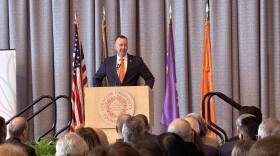Now that a higher minimum wage is coming for workers in New York state, nonprofits plan to begin lobbying the state for more funding, in order to keep their agencies afloat.
At Access-CNY in Syracuse, the biggest number of employees are direct support professionals. Hundreds of these workers provide hands-on support for more than 3,000 central New Yorkers with developmental disabilities, acquired brain injuries and mental illnesses. They make $10-dollars and 25 cents an hour.
Executive director Prudence York says the time is coming when the state will need to come through with more support for agencies like these.
"Over the course of the next several months, this has to be rectified, because come January 1st, you can flip burgers at a higher rate of pay than you can support people with disabilities,” said York.
York says neither these workers, nor their supervisors who make $15 an hour, should be considered minimum wage employees. Nonprofits like Access-CNY can’t raise rates on services the same way a business can increase the cost of a burger. So the only way out of this is for the state to come through with extra cash.
“The state has to increase our rates to allow us to continue to provide that service,” said York.
Some estimates are that statewide it would cost the state $18 million to keep agencies like this afloat. York hopes someone is listening.
"You really have to step back and say, what if I needed someone to help me bathe? What if I needed someone to feed me? What if I needed someone to help me get out of bed every day? That’s the kind of people we’re talking about. These are not folks that can go without service. And I have to believe the state, all of the citizens as well as elected officials, understand that point.”








